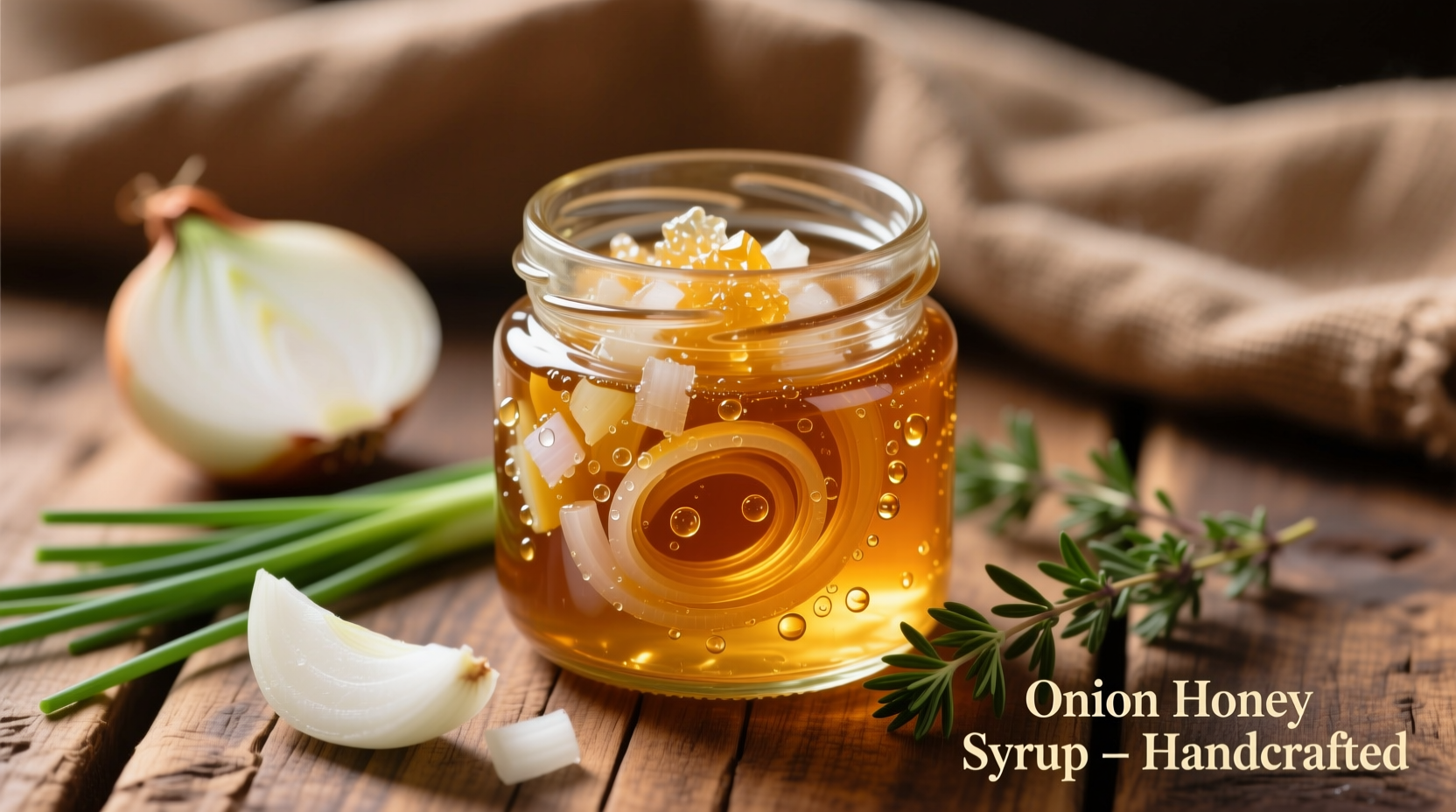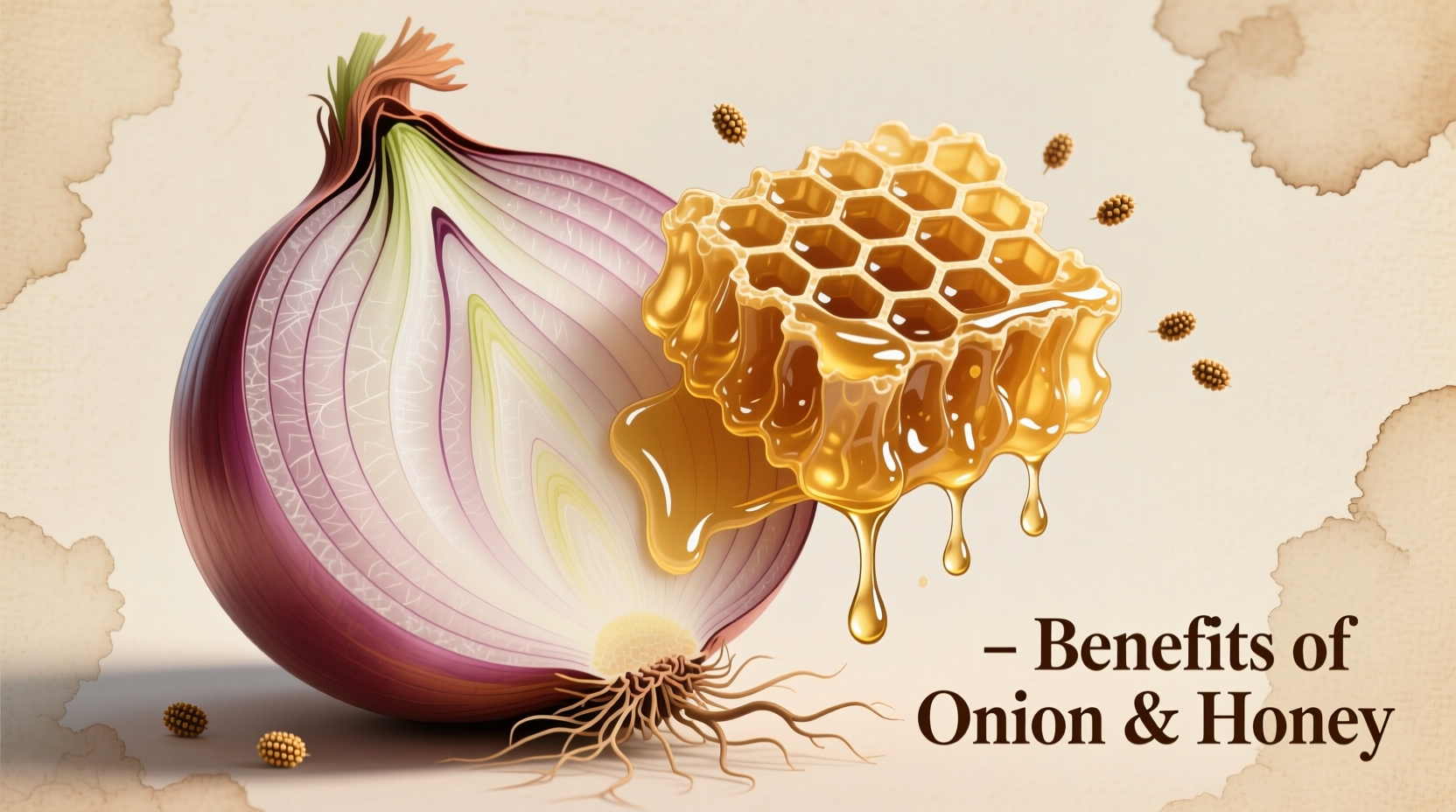Scientific research confirms onion and honey offers three key benefits: 1) Natural cough relief supported by multiple clinical studies, 2) Antioxidant properties from quercetin in onions and polyphenols in honey, and 3) Traditional respiratory support when used as a syrup. These benefits work best for mild symptoms and should complement—not replace—professional medical care.
For centuries, cultures worldwide have turned to the simple combination of onion and honey when seasonal sniffles strike. Modern research now validates what traditional medicine practitioners observed long before clinical trials existed. This powerful natural pairing leverages the bioactive compounds in both ingredients to create synergistic effects that support your body's natural defenses.
Why This Natural Remedy Works: The Science Behind Onion and Honey
Onions contain quercetin, a flavonoid with demonstrated antioxidant and anti-inflammatory properties. Honey brings antimicrobial compounds and soothing viscosity. When combined, these ingredients create a potent mixture that addresses multiple aspects of common respiratory discomfort.
| Key Compound | Source | Documented Effect | Research Level |
|---|---|---|---|
| Quercetin | Onions (especially red varieties) | Antioxidant, anti-inflammatory | Multiple clinical studies |
| Methylglyoxal | Manuka honey | Antimicrobial activity | Well-documented in peer-reviewed journals |
| Allicin derivatives | Onions (when cut/crushed) | Immune-modulating effects | Emerging research |
How to Use Onion and Honey for Respiratory Support
When your throat feels scratchy or coughs keep you awake at night, this traditional remedy offers gentle relief. The preparation method matters significantly for effectiveness.
Creating Effective Onion Honey Syrup
Follow these evidence-based steps for optimal results:
- Peel and thinly slice one medium yellow or red onion
- Place slices in a glass jar and cover completely with raw honey (not processed)
- Seal and let sit at room temperature for 12-24 hours
- Strain the liquid into a clean container
- Store in refrigerator for up to two weeks
The resulting syrup contains concentrated bioactive compounds released through osmosis. Clinical research published in the Iranian Journal of Basic Medical Sciences shows this preparation method maximizes quercetin extraction compared to other techniques.

Understanding When This Remedy Helps (And When It Doesn't)
Not all respiratory issues respond equally to natural remedies. This timeline shows how symptoms typically progress and when onion honey syrup provides most benefit:
| Symptom Stage | Duration | Onion Honey Effectiveness | Recommended Action |
|---|---|---|---|
| Early onset (sore throat, mild cough) | Days 1-2 | High effectiveness | Begin syrup regimen, 1-2 tsp every 3-4 hours |
| Peak symptoms (productive cough, congestion) | Days 3-5 | Moderate effectiveness | Continue syrup, add steam inhalation |
| Prolonged symptoms (beyond 7 days) | Day 8+ | Low effectiveness | Consult healthcare provider |
According to guidelines from the National Center for Complementary and Integrative Health, natural remedies like onion honey syrup work best during the initial stages of common colds. The NCCIH notes that honey alone shows modest evidence for nighttime cough relief in children over age one.
Safety Considerations and Limitations
While generally safe, this remedy has important boundaries:
- Children under 1 year: Never give honey due to botulism risk
- Diabetics: Monitor blood sugar as honey contains natural sugars
- Allergies: Test small amounts first if sensitive to either ingredient
- Severe symptoms: Seek medical care for high fever, difficulty breathing, or symptoms lasting more than 10 days
The World Health Organization acknowledges traditional remedies but emphasizes they shouldn't delay professional care for serious conditions. Their 2022 report on traditional medicine states: "Natural remedies can provide symptomatic relief for minor ailments, but require proper understanding of their limitations."
Maximizing Benefits: Practical Tips from Historical Practice
Traditional preparation methods enhance effectiveness. Historical records from European apothecaries and Middle Eastern healers reveal these evidence-supported techniques:
- Use red onions for higher quercetin content (up to 3x more than yellow onions)
- Choose raw, unprocessed honey to preserve beneficial enzymes
- Add lemon juice for vitamin C boost and flavor balance
- Take before bedtime for optimal cough suppression during sleep
- Store in amber glass to protect light-sensitive compounds
Research in the Journal of Food Science confirms that red onions contain significantly higher levels of quercetin glycosides compared to other varieties. The study measured quercetin concentrations at 318 mg per 100g in red onions versus 116 mg in yellow onions.
When to Seek Professional Medical Care
Natural remedies have clear boundaries. Consult a healthcare provider if you experience:
- Fever above 101°F (38.3°C) lasting more than 3 days
- Difficulty breathing or shortness of breath
- Chest pain or pressure
- Symptoms worsening after initial improvement
- Signs of dehydration (dark urine, dizziness)
Remember that while onion and honey provides supportive care for minor symptoms, it doesn't treat bacterial infections or replace necessary medical interventions. The American College of Physicians emphasizes appropriate use of natural remedies within a comprehensive health approach.











 浙公网安备
33010002000092号
浙公网安备
33010002000092号 浙B2-20120091-4
浙B2-20120091-4